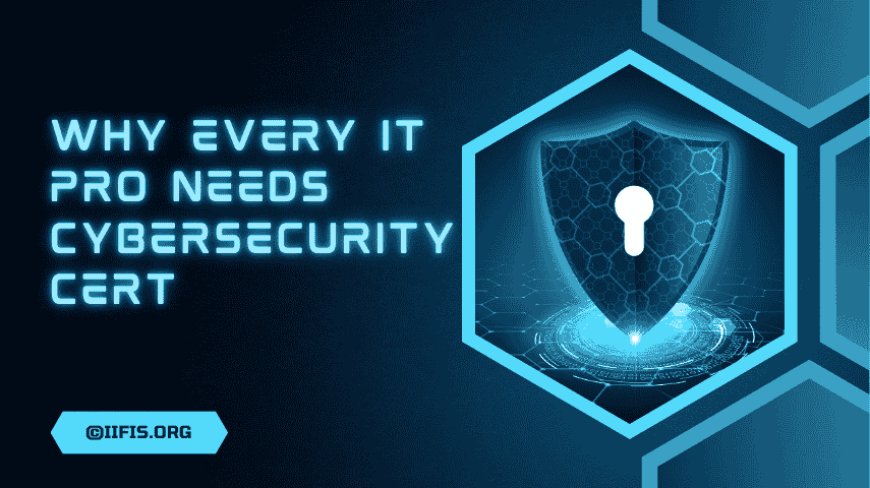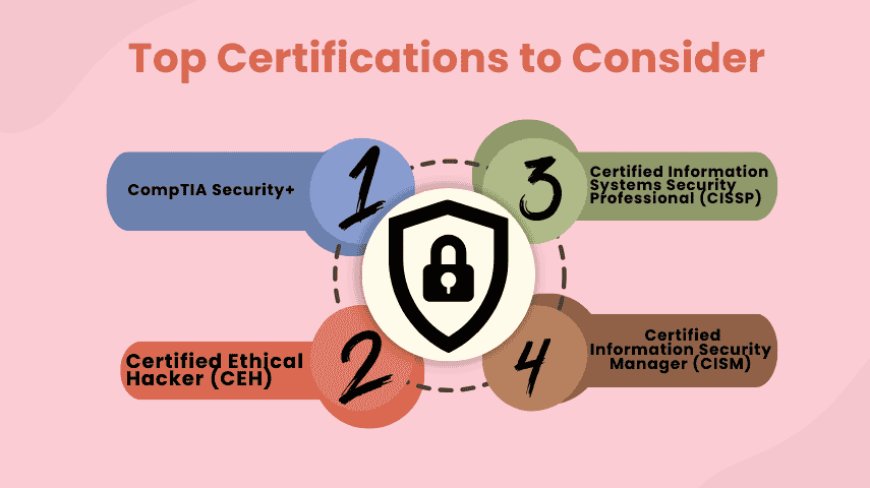Why Every IT Pro Needs Cybersecurity Cert
Discover why cybersecurity certifications are essential for IT professionals. Learn how they enhance skills, boost career prospects, and provide the expertise needed to defend against modern cyber threats

In an increasingly digital world, cybersecurity has become one of the most critical fields in IT. With the rise in cyberattacks, data breaches, and sophisticated hacking techniques, every IT professional needs to have a solid understanding of cybersecurity principles to protect sensitive information and protect systems. Cybersecurity certifications are more than just a resume boost—they are essential for anyone working in IT, as they provide the knowledge and skills needed to identify, prevent, and respond to security threats. In this blog, we’ll explore why every IT pro should consider earning a cybersecurity certification, how it improves your career, and how it helps organizations stay secure in today’s threat environment.
What are Cybersecurity Certifications?
Cybersecurity certifications are credentials that validate an individual's skills and knowledge in protecting networks, systems, and data from cyber threats. These certifications demonstrate expertise in specific areas of cybersecurity, making professionals more competitive in the job market and trusted by employers. They cover a wide range of topics, from ethical hacking and network defense to security management and compliance.
Types of Popular Certifications:
-
CISSP (Certified Information Systems Security Professional): A highly regarded certification focusing on security management and best practices.
-
CEH (Certified Ethical Hacker): Focuses on ethical hacking techniques to identify vulnerabilities.
-
CompTIA Security+: Entry-level certification covering basic security concepts and practices.
-
CISM (Certified Information Security Manager): Targets security management and governance.
-
CISA (Certified Information Systems Auditor): Focuses on auditing, control, and assurance of information systems.
How Certification Works
To earn a cybersecurity certification, candidates typically need to study the related subject matter, either through self-study, online courses, or formal training programs. Once prepared, they must pass a certification exam, which usually involves multiple-choice questions, scenario-based questions, and sometimes hands-on practical assessments.
The Rising Demand for Cybersecurity Skills
Cyber Security Threat Environment:
-
Increasing cyber threats such as malware, phishing, ransomware, and data breaches.
-
High-profile attacks like the Colonial Pipeline ransomware and breaches at Equifax and SolarWinds demonstrate widespread vulnerabilities.
-
Cybercrime costs are projected to reach $8 trillion annually by 2023, highlighting the urgency of cybersecurity measures.
Shortage of Cybersecurity Professionals:
-
There is a global shortage of skilled cybersecurity professionals, with 3.4 million unfilled cybersecurity jobs worldwide (2022, (ISC)²).
-
Businesses face increasing risks due to the lack of trained experts.
-
Certifications (e.g., CISSP, CEH, CompTIA Security+) help IT professionals bridge the skills gap and meet the growing demand for cybersecurity expertise.
Benefits of Cybersecurity Certification for IT Pros
Enhanced Career Opportunities:
-
Increased job security and better career prospects with certified cybersecurity skills.
-
Access to cybersecurity roles offering higher salaries and growth potential.
Validation of Expertise:
-
Certifications provide proof of specialized knowledge and practical experience.
-
Gain credibility and trust from employers, colleagues, and clients.
Stand Out in Competitive Job Markets:
-
Differentiate yourself from IT professionals without cybersecurity credentials.
-
Strengthen your resume and LinkedIn profile, making you more attractive to potential employers and better job offers.
Essential Certifications for IT Professionals
Top Certifications to Consider:

-
CompTIA Security+:
-
Entry-level certification that provides foundational knowledge of cybersecurity concepts, such as network security, threats, and vulnerabilities. Ideal for beginners in the field.
-
Certified Information Systems Security Professional (CISSP):
-
Advanced certification for seasoned professionals. Covers a broad range of cybersecurity domains, including risk management, cryptography, and security architecture. Ideal for senior security roles.
-
Certified Ethical Hacker (CEH):
-
Focuses on the skills needed to identify and exploit vulnerabilities in systems. It's designed for professionals interested in ethical hacking and penetration testing roles.
-
Certified Information Security Manager (CISM):
-
Aimed at professionals managing enterprise-level security programs. It emphasizes security governance, risk management, and compliance.
Certifications Based on Career Goals:
-
Network Security: Start with CompTIA Security+ for foundational knowledge, then pursue CISSP or Cisco Certified CyberOps Associate for more advanced roles.
-
Ethical Hacking: For ethical hackers or penetration testers, CEH is the key certification. Professionals can advance with Offensive Security Certified Professional (OSCP).
-
Security Analysis: CompTIA Security+ is a good starting point. For more advanced analysis and risk assessment roles, Certified Information Security Auditor (CISA) is recommended.
-
Risk Management and Security Leadership: CISM or CISSP certifications are ideal for those focusing on overseeing and managing an organization's security policies and risks.
Each certification is tailored to specific career paths, helping IT professionals enhance their expertise in their chosen fields.
Why IT Pros Without Cybersecurity Skills Are Falling Behind
Evolving IT Roles:
-
The modern IT landscape demands cybersecurity expertise across various disciplines like cloud computing, network administration, and systems administration. As cyber threats become more sophisticated, IT professionals without security skills struggle to keep up with evolving job requirements.
Impact of Cybersecurity Incidents on Career:
-
Lacking cybersecurity knowledge can lead to mistakes that make systems vulnerable to attacks, potentially resulting in costly breaches. IT pros without these skills face a limited career trajectory, as companies prioritize those who can safeguard their infrastructure against threats.
Regulatory Requirements:
-
Industries like finance and healthcare require cybersecurity knowledge to comply with strict regulations such as GDPR, HIPAA, and PCI-DSS. Professionals without cybersecurity expertise may find themselves unable to meet these legal standards, which can hinder career advancement in regulated fields.
How Cybersecurity Certifications Benefit Employers
Increased Security Posture:
-
Certified professionals equip organizations with the expertise needed to prevent cyberattacks and effectively mitigate security risks, strengthening overall security defenses.
Reduced Costs from Cyber Incidents:
-
A well-prepared, certified team can detect and address vulnerabilities before they lead to data breaches or other costly security incidents, saving the company from potential financial and legal repercussions.
Boosts Company Reputation:
-
Having a certified cybersecurity team enhances the company’s reputation, making it more attractive to clients, partners, and stakeholders who prioritize data security and compliance.
Steps to Get Cybersecurity Certified
Preparation:
-
Choose the Right Certification: Select a certification based on your current skill level and career goals (e.g., CompTIA Security+ for beginners, CISSP for advanced professionals).
-
Study Resources: Use official training courses, study guides, and practice tests to thoroughly understand the certification topics and exam format.
Taking the Exam:
-
Schedule and Prepare: Plan your exam date when you feel confident in your knowledge. Create a study schedule to cover all topics systematically.
-
Hands-On Experience: Engage in labs and practical exercises to gain real-world skills, which are crucial for both exam success and applying your knowledge on the job.
Cybersecurity skills are essential to protect organizations from ever-increasing cyber threats. As the demand for security expertise grows, professionals without cybersecurity skills risk falling behind. Obtaining cybersecurity certifications not only validates your knowledge but also helps future-proof your career by making you more competitive in a rapidly evolving field.
If you're an IT professional looking to enhance your skills, consider pursuing certifications to stay ahead. Programs like those offered by IIFIS can help you achieve your cybersecurity career goals and secure your future in the industry.
























